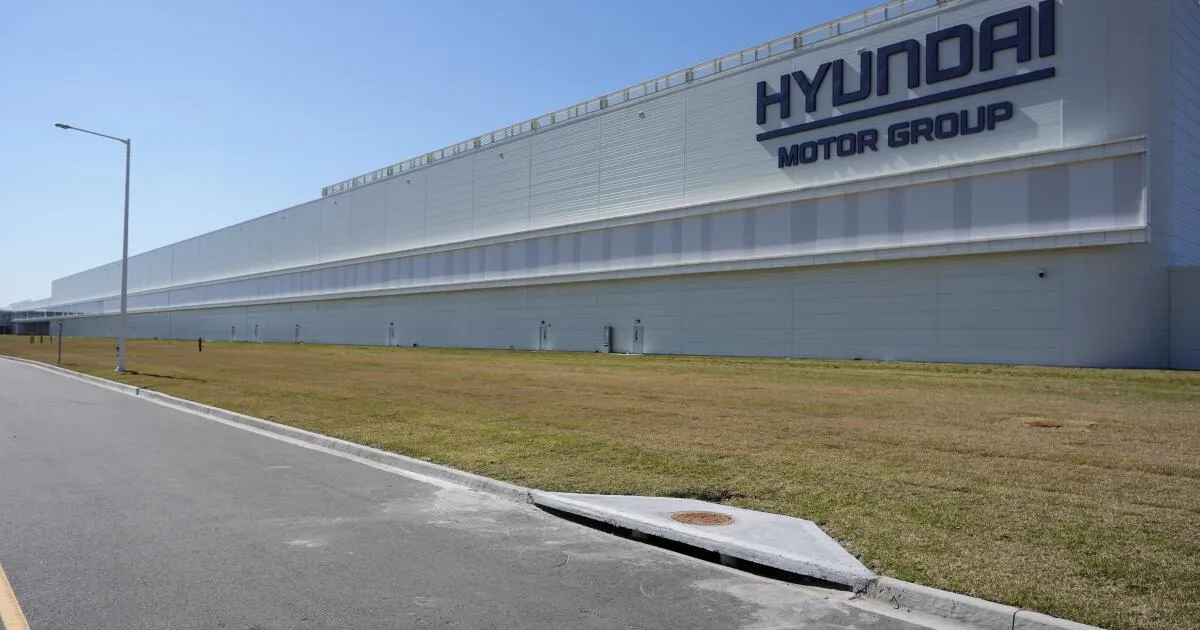
In a significant development, South Korea has announced that the Trump administration has agreed to release hundreds of Koreans who were detained during the largest U.S. immigration raid in history. South Korean presidential chief of staff, Kang Hoon-sik, confirmed on Sunday that negotiations with U.S. officials are nearing completion, aiming to secure the release of the workers arrested in a federal immigration crackdown at a factory in Georgia, where LG Energy Solution and Hyundai are collaborating on a manufacturing project.
The federal immigration raid took place last Thursday at a factory site located in Ellabell, Georgia. During this operation, federal agents arrested a total of 475 individuals, with more than 300 of those detained identified as South Korean citizens employed by LG Energy and its subcontractors. Kang indicated that the workers could potentially return home on a chartered flight as soon as this week, emphasizing that the South Korean government will remain vigilant until all citizens are safely back in their homeland.
The timing of the raid has sparked disbelief and indignation among South Koreans, particularly as it coincides with significant investments pledged by South Korea’s largest companies to enhance their manufacturing footprint in the U.S. This investment initiative is part of a trade agreement reached earlier this year between President Trump and South Korean President Lee Jae Myung. Under this agreement, Trump announced in July that tariffs on most imports from South Korea would be reduced to 15%, contingent upon South Korea's commitment to invest $350 billion in key U.S. industries and purchase $100 billion worth of liquefied natural gas.
In response to the incidents at the factory, ruling party lawmaker Oh Gi-hyoung stated that South Koreans should be treated with the respect deserving of their country’s status as a principal U.S. ally and investor. Recent statistics from South Korea’s Finance Ministry indicate that the U.S. accounted for the largest share of South Korea’s overseas investments, totaling $26 billion in the previous year. Additionally, South Korea ranks as the U.S.'s eighth-largest trading partner, with bilateral trade amounting to $242.5 billion in goods and services.
The operation, described as the largest single-site raid by the Department of Homeland Security, is part of a broader initiative known as Operation Take Back America, aimed at addressing illegal immigration issues. The U.S. Immigration and Customs Enforcement (ICE) agency has reported that many of those arrested were working illegally, often holding short-term or recreational visas that do not permit employment.
As of 2022, it was estimated that around 110,000 unauthorized South Korean immigrants were residing in the U.S., representing about 1% of the total undocumented immigrant population, according to data from the Pew Research Center. Experts in South Korea have warned that even with a swift release of the detained workers, this heavy-handed crackdown could alter perceptions of the trade relationship between the U.S. and South Korea.
Industry analysts have suggested that this immigration crackdown may create logistical challenges for ongoing and future projects undertaken by South Korean companies in the U.S. Notably, South Korea has recently announced a $150 billion initiative aimed at revitalizing the declining American shipbuilding industry, alongside nearly ten battery plant projects currently in development across the country.
For years, South Korean companies have utilized non-work travel permits, such as the ESTA (Electronic System for Travel Authorization), to send technical specialists to oversee U.S. factory construction. This visa waiver allows visitors to remain in the U.S. for up to 90 days, yet technically does not permit employment. Hwang In-song, an industrial policy expert at the Korea Electronics Technology Institute, noted that while this practice has been tolerated by U.S. authorities, it is becoming increasingly scrutinized.
Obtaining the appropriate work visas, such as the H-1B visa, has proven challenging for South Korean companies, as these visas are allocated through an annual lottery and have become more difficult to secure under the Trump administration. Chun Jong-joon, a Korean American immigration lawyer based in Washington, highlighted that the lengthy acquisition process for H-1B visas—often taking over eight months—discourages companies from pursuing this route.
Experts have indicated that finding qualified American workers to fill specialized roles in lithium-ion battery manufacturing or shipbuilding is challenging. Hwang emphasized that, for the time being, sending experienced South Korean specialists remains the only viable solution.
Following the release of the detained workers, South Korean officials have expressed intentions to advocate for improvements in U.S. work permits for South Korean citizens. Countries such as Chile, Australia, and Singapore have established special work visa programs that facilitate employment for their citizens in specialized roles in the U.S. Until such improvements are made, the recent arrests at the Georgia battery plant are expected to result in considerable delays and complications, as the joint venture navigates the redeployment of workers.
As Hwang noted, LG Energy Solutions and similar companies will likely reconsider future worker dispatches to the Georgia plant, indicating a cautious shift in South Korea’s approach to its investments in the U.S. market.